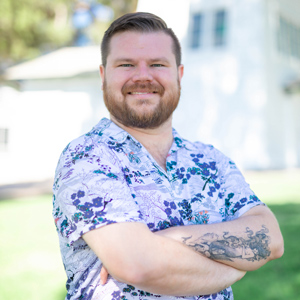Nicholas "Nick" Denson, MA, LCPC, LCADC, ATR-BC, NCC, is a Licensed Clinical Professional Counselor, Registered and Board-Certified Art Therapist, and Adjunct Professor. He specializes in expressive therapies, trauma-informed care, queer-affirming practice, and work with military families, adolescents, and individuals navigating substance use and recovery. Nick brings experience across a variety of settings, including community mental health, crisis intervention, military mental health counseling, and nonprofit organizations.
He has facilitated art therapy groups for diverse populations and served as a Peace Corps Volunteer in Rwanda, where he worked in maternal and child health, education, and nutrition. He integrates a multicultural and social justice lens into both his clinical practice and teaching, centering accessibility, cultural responsiveness, and community-based healing.
In addition to his clinical work, Nick teaches graduate courses in counseling and art therapy, with emphasis on group dynamics, addictions counseling, and qualitative research methods. His scholarship explores how art therapists conceptualize art as a language, as well as collaborative, decolonial, and arts-based research approaches.
Nick is passionate about supporting emerging professionals through supervision, mentorship, and research. He remains committed to fostering creativity, resilience, and equity in both clinical and academic spaces.
Nick earned his Bachelor of Arts from Christopher Newport University, where he double majored in Studio Art and Psychology. He went on to complete a Master of Arts in Art Therapy at The George Washington University in 2015. In August 2025, he completed a Master of Social Work at the University of Nevada, Reno. He is currently pursuing his doctorate in Expressive Art Therapies at Lesley University.
Teaching is a transformational process that engages the whole person intellectually, emotionally, creatively, and relationally. In my courses, I strive to create environments where students connect academic knowledge to personal insight while developing a strong professional identity. Learning extends beyond theory to include opportunities for reflection, ethical engagement, and self-awareness, all of which prepare students for client-centered, trauma-informed care. I incorporate experiential methods such as art-based case exploration, clinical role plays, reflective journaling, and practice-based discussion prompts that help students integrate theory with lived experience and develop deeper insight.
Equity and cultural responsiveness are central to my teaching. I design courses using universal design principles, offer varied forms of engagement, and foster a classroom culture that values diverse perspectives. Student feedback informs my pacing, assignments, and discussions, ensuring that learning remains collaborative and responsive. I bring this same developmental perspective into supervision, guiding students as they translate academic learning into confident, ethical, and reflective practice. My goal is to cultivate spaces rooted in transformation, inclusivity, and creativity while continuing to grow alongside my students through reflection and humility.
- Group Counseling

